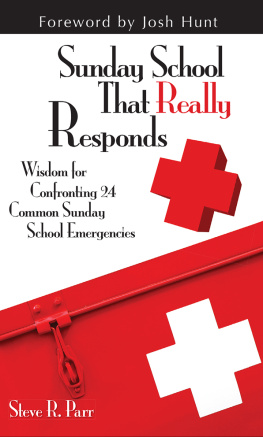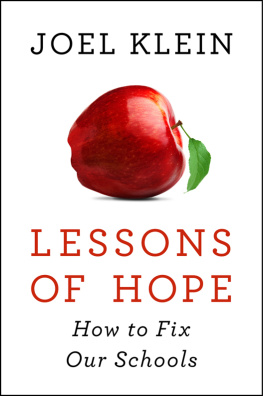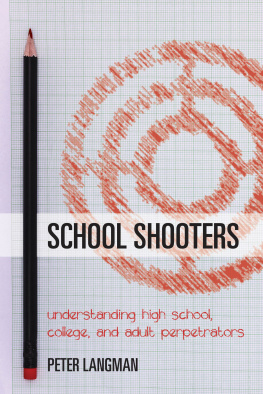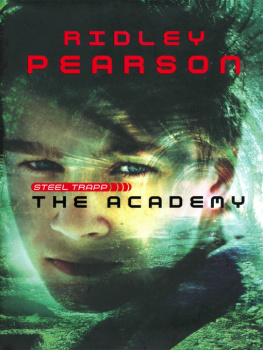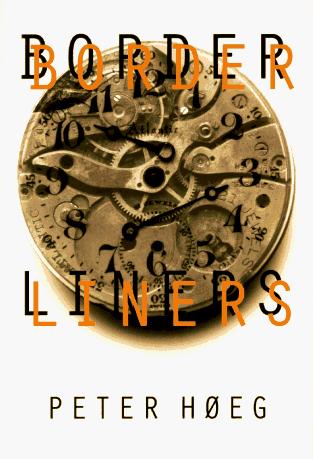Peter Heg
Borderliners
1993
In this extraordinary novel, Hoeg portrays the closed world of Biehls, a Danish private school where a bizarre social experiment is underway. The narrator, Peter, is now a student at Biehls after spending all of his life in childrens homes and reform schools. He is a borderline case, along with Katarina, whose parents both died in the past year, and August, severely disturbed after killing his abusive parents. Although allowed no social interaction, the children conspire to conduct their own experiment to discover what plan is being carried out at Biehls. Hoeg touches on some of the same themes as in his acclaimed Smillas Sense of Snowneglected children, scientific experiments, and technology-but this is not a thriller and may not appeal to the same audience. It is instead a fascinating intellectual puzzle that explores the themes of social control, child assessment, family, and the concept of time. Highly recommended.
PART ONE
ONE
W hat is time?
We ascended toward the light, five floors up, and split up into thirteen rows facing the god who unlocks the gates of morning. Then there was a pause, then in came Biehl. Why the pause?
When asked straight out about his pauses by one of the bright girls, Biehl had first gone absolutely still. Then hewho normally never referred to himself as Ithen he had said, slowly and with great gravity, as though he was surprised by the question, and perhaps even by his own reply, When I speak, you should listen, first and foremost, to my pauses. They speak louder than my words.
And so it was with the interval between the hall going absolutely still and him coming in and up to the podium. An eloquent pause. His own words.
The morning song was followed by a pause, the Lords Prayer recited by Biehl pause, a short hymn pause, a traditional, patriotic song pause, and finish, and he left the hall as he had come, briskly, almost running.
What feeling was there in the hall while this was going on?
There was no special feeling, really, I said, it was early in the morning and people were tired, and could we finish now, I was getting a headache, and it was late, the bell had gone already, I pointed out the time.
Not yet, she said, there was yet another relationship she wanted to call to my attention, and that was the relationship to pain. When pain made itself felt during an experimentlike now, with this headacheone should never just break off and walk away from it. Instead one should turn upon it the light of awareness. That is how she spoke. The light of awareness.
And so we turned upon the fear.
Biehl had written his memoirs, In Grundtvigs Footsteps. It contained the names of all the teachers who had ever occupied position at the school, all the moves to bigger and better premises, a long string of achievements, and the rewards for such. But not one word about the relationship to the pupils, and so nothing either about the fear. Not one word, not even in the pauses or in the spaces between the lines. At first it was impossible to understand. Because that was the truly significant factor. Not the respect, not the admiration. But the fear.
Later it became clear that this reticence was part of the more far-reaching plan. And then I understood.
We stood utterly still during assembly. That was the first thing I tried to get through to her.
At a certain time every day you were let into the assembly hall, 240 people with 26 teachers and Biehl, and then the doors were shut, and you knew that from this moment for the next quarter of an hour you had to stay completely still. The prohibition was total, giving rise therefore to a certain tension in the room. As though the rule, by covering everything and by tolerating nothing, called for its own violation. As though the tension in the room was part of the plan.
Over the years it had proved impossible to have the prohibition observed absolutely. But those few violations that had occurred had, in fact, only served to confirm and reinforce the rule.
Those few times it happened, there had been a faint commotion among the pupils, a hemming and a hawing, and a rustling that spread like an infection and, for a while, could not be stopped. A critical situation, one of the most difficult for a man in Biehls position. The passive resistance of a crowd of small people.
On these occasions he had been brilliant. He did not try to pretend that nothing had happened. He bowed his head and took the disturbance upon himself. He stood like that, head bowed, while the tension in the room rose, and eventually the fear stifled the disturbance.
At no time had he looked directly at anyone; he carried on with assembly as usual. Even so, you knew that he knew who had started it. That he had located the source, and knew how it should be stopped.
Another teacher, who should have been there, never came. Instead, the door to the classroom stood open, and we waited for a pause so long that what we had known all along was confirmed for us. Then Biehl came in, very quick and brisk.
Sit down, he said. Jesremain standing. He needed some time to get into his stride. Not much, even though it felt that way after I became ill, probably only a couple of minutes. Just long enough to go over what had happened. That Jes had disrupted assembly for his schoolfellows, disrupted a school timetable that was already overstretched, abused the trust put in him, and, suddenly, the blow fell.
Very fast, and yet with a weight that jolted the body free of the desk and out into the aisle.
Just after it struck, there was a brief pause, and even though this was what held the key to the fear, it was so brief that it went unnoticed, I said, lets not talk about it anymore.
On the contrary, she said. Thats exactly what we have to talk about. So I tried: When the blow fell, first there was a brief lull, when the shock had brought everything to a standstill. Then came two things at once. The relief that everything had now been put to rights, and something elsesomething deeper, far-reachingthat occurs when an adult hits a child hard, something that has nothing further to do with the pain from the blow.
Back by the blackboard Biehl adjusted his clothing. Like a man who has been to the toilet. Or with a hooker. And has now put behind him something that was difficult but necessary.
She did not understand me, so we went on.
How often does it happen? she asked.
Before my illness there had been no reason to wonder about how often. But now, when it was necessary to be aware of time all the time, it turned out to be very seldom, less than once a week in any one class. Quite precisely administered.
How come?
It was early to start initiating her into the inner truths, but I dit anyway. There was a law, it was Karin r who had given this away, that dated from antiquity. When gilding a surface it was not desirable to cover it 100 percent with gold. On the contrary, one achieved the best effect if one covered just over 60 percent. A variation on the law of the golden mean.
So it was, too, with the relationship between time and punishment. Of those violations that were proven, only just over half evoked punishment.
Sort of like a golden mean of violence.
How many times had I, personally, been hit?
To this I was able to reply in the negative, as far as my time here at the schoolthat was, two years and two monthswas concerned; in all that time, until recently, I had never once been hit or been given detention, nor, until I became ill, so much as a reprimand or an L for Late.


